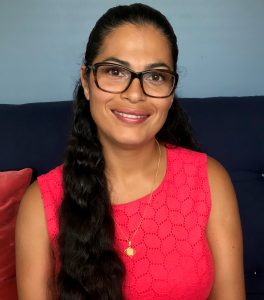By Maddie Ellis, Novant Health Healthy Headlines
To find and book a pediatrician click here.
Just about everyone relies on internet searches to navigate life. But when it comes to parenting, getting a straight answer online is never easy. With misinformation, divided opinions and the difficulty of not always knowing whom to trust, the internet can be a parent’s nightmare.

Dr. Annie Condon
Dr. Ann Pittoni-Condon, a pediatrician at Novant Health Pediatrics Denver, and Soltana Nosrati, a psychotherapist at Novant Health Psychiatric Associates – Huntersville, have noticed many parents struggle with this.
“I see so many moms come in and are just exhausted by the input, and they just feel like they are making wrong decisions left and right,” Condon said. (Most parents know her as Dr. Annie Condon, so we’ll refer to her as that.)
We spoke with Condon and Nosrati for advice on consulting the internet, connecting with the unique needs of their child, finding credible sources of information and combatting parents’ feelings of guilt and anxiety.
Parenting online
Condon has noticed two primary dangers with over-reliance on the internet: opinion disguised as fact, and that people looking things up on Google may not have the medical knowledge to interpret the information correctly.
“I have a little phrase that I’ve been telling parents for over 15 years now: ‘Everything you look up on the internet leads to autism, cancer or death,’” Condon said.
In reality, most children are very resilient, Condon said. “Most of the time, our kids are going to be 100% fine. Most of them do not have these illnesses that are talked about online, but these things are hooks, and parents get hooked in.”
As a mother of twins, Nosrati herself knows when she needs to seek advice, but she’s careful to never take one person’s word as gospel. “I take what makes sense for my family unit, and I leave what doesn’t,” she said.
Fight the urge to use Dr. Google
 There are strategies to stop turning to Google for everything in the first place. Start by asking your pediatrician, a crucial source to interpret the science and research behind child development.
There are strategies to stop turning to Google for everything in the first place. Start by asking your pediatrician, a crucial source to interpret the science and research behind child development.
Another way to fight the urge is to limit your exposure. Delete apps from your phone, reduce your access to social media and intentionally put down the phone for a set period every day.
Listening to too many sources — whether they’re friends, family or experts — can be overwhelming. Use what information works for you and bypass the rest. And trust your parental instincts, Nosrati said.
“You gave birth to this child: Sit still for a moment and ask yourself what feels right here, especially when they’re young,” she said. “And chances are if you follow your heart in that sense, you’ll do the right thing more often than you don’t.”
‘I just feel like I’m a bad mom’
Both Nosrati and Condon said the internet can fuel “mommy guilt” and ratchet up stress and anxiety that you don’t measure up to mythical “perfect” parents that grace so many blogs and articles.
“Google and social media are part of our lives,” Nosrati said. “And it’s literally destroying our own sense of self for a lot of people, because it can make you feel bad about the way you choose to parent or how you lead your life.” The answer? Step away from endless scrolling.
And Condon reminds us social media often distorts reality. More often than not, posts are carefully curated collections of what people want others to see. “No one is going to take a picture of their messy house and put it on Facebook,” she said. “They are always going to have the picture-perfect selfie, everything looks great. And for many moms … it’s very overwhelming, and it can be very depressing, and it creates a lot of anxiety.”
Another way to fight feelings of parental guilt is to stop relying on the judgment of anyone outside of your relationship with your child. Instead of looking to external sources for approval, look to your child.
When Nosrati hears that a parent is concerned that they are a “bad mom,” she asks something like: “When your child is in pain, who do they turn to?”
With the exception of some teenagers, Nosrati said, kids usually look to the parent.
“And I say, ‘Well, that’s your clue.’”
Understand your child’s unique needs
Remember, every child is different.
To help develop a parental instinct and pick up on the unique cues of your child, spend intentional time with your child. And it’s hard to do that with a phone in your face, they said.
“You might not be able to carve out three hours for your child every night,” Nosrati said. “But just about all of us can figure out a way to carve out 10 minutes here and 10 minutes there.”
During this one-on-one time, parents should focus on the child’s behavior, noticing the little things: How they move, how they babble, what their playing style is and what they like to talk about. To do this, Nosrati recommends avoiding side conversations and tuning out any thoughts of work or that to-do list.
Just observing what a child is doing with certain toys or objects, without giving directions or guidance, can help parents understand how the child interacts in the world, Condon said.
For Nosrati, 4 a.m. often brought some of those moments. At that time, one or both of her children would wake up to be fed.
“I would remember taking a breath and just staying in the moment,” she said. “And I stayed in the moment by touching their fingers or sniffing them — doing things like that keep you in the moment and focused on what you need to focus on.”
That can give parents the ability to recognize when something is wrong and teach parents to address a child’s needs by themselves.
“Learning how to problem-solve their child’s need on their own, rather than looking to the internet every time there’s an issue, gives them the self-satisfaction that, ‘I was able to figure this out on my own, and the next time there’s a problem, I can figure it out again,’” Condon said.
Find credible information
Because every child is different, it’s important that you seek out resources that are individualized to your family unit. For her patients, Condon said she gives advice that is specific to the child, the family and the situation.
“As pediatricians, we see these children, most of them, from the time they are born to the time they are 18, so we know these families,” she said. “We know them sometimes as well as our own families.”
Novant Health has a variety of virtual care options and after-hours help via your provider’s clinic where parents can get help with emergency questions that cannot wait until morning. Parents can also directly message their pediatrician on MyChart for nonemergencies.
Another source that Condon recommends is HealthyChildren.org, a website run by the American Academy of Pediatrics. Everything is written by physicians, covering topics from potty-training to puberty.
By encouraging a more limited use of the internet, Condon hopes to reduce feelings of shame that come from exposure to other people’s parenting styles.
“I tell parents: Reach out to your pediatrician, don’t rely on anything that ends in ‘.com’ and find a safe place online for parents to learn. We talk about internet safety with our children, but we also need to have internet safety with adults.”
Novant Health
Healthy Headlines
Facebook
Instagram
Twitter
YouTube




